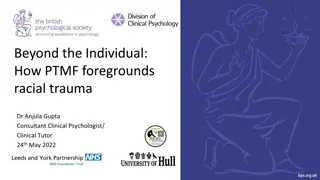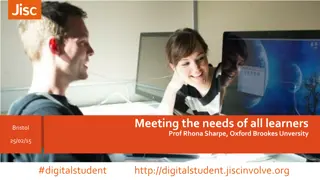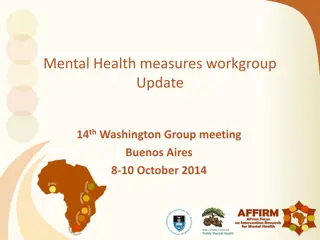Understanding the Experiences of Marginalized Learners with Mental Health Disabilities
This research project focuses on exploring the challenges faced by students with mental health disabilities in a design qualification. Through experiential interviews and empirical research, the aim is to develop recommendations to reduce the awarding gap and enhance progression for these learners. The analysis involves creating individual student personas and thematic analysis to identify enablers and barriers, ultimately aiming to support the academic success of marginalized learners.
- Marginalized learners
- Mental health disabilities
- Design qualification
- Empirical research
- Academic support
Download Presentation

Please find below an Image/Link to download the presentation.
The content on the website is provided AS IS for your information and personal use only. It may not be sold, licensed, or shared on other websites without obtaining consent from the author. Download presentation by click this link. If you encounter any issues during the download, it is possible that the publisher has removed the file from their server.
E N D
Presentation Transcript
Embracing the voices of the marginalised learners with a declared mental health disability Nicole Lotz and Muriel Sippel, The Open University 12 May 2022
Background Consistently low and variable pass rates and large awarding gaps for students with a declared mental health disability across the Design Qualification Aims 1. Gain a deeper understanding of the specific issues experienced by Design students with mental health disabilities throughout their study. 2. Develop recommendations that could inform the learning design of modules in production and positive interventions in presentation to reduce the awarding gap and facilitate progression. Focus on intersecting factors: Discipline (knowledge and skills, coursework, assessment), Personal circumstances (work and family, caring commitments, life events), Support received during their studies from OU and elsewhere 2
Approach Experiential, phenomenological, qualitative, and longitudinal over 4-5 months 4 passionate interviewers, working each with 2 students from one module (levels 1-3) Aim to build a conversational, trusting relationship, but not as a tutor, more like a friend with a good listening ear! Student selection: aim for diversity Prev. high and low achieving Mix of gender and background (e.g. age, ethnicity) Low sample size at higher levels challenging 3
Empirical research Interviews Beginning and end Experience sample Scheduled prompts to mobile phone 3 times a day Two in the moment experiences (doing, feeling, thinking) and one reflective end of day recording on barriers enablers Diary One message thread a day Aim at collecting 7 entries over 10 days, describing how they have progressed their assessed project work. Debriefings 4
Analysis Cases Individual student stories can be used as Personas Thematic analysis In vivo if possible, aiming for diversity and overlaps (difference and similarity) in themes across cases Themes comparison to Lister s taxonomy -> Tensions, contradictions and resolutions Enablers and barriers in the same themes tensions need to be resolved to move a barrier to being an enabler 5
Case 1 'Anna' Level 3 student, female, 30s. LGBTQ learner, full time carer for partner, voluntary work Bipolar Postural tachycardia syndrome (PoTS) Anxiety
Anna Background OU study enablers OU study barriers LGBTQ learner With Bipolar, some days are not good for studying, so stop, rest, wait for a better day. Overthinking, not getting quick reply to question - more anxious. Long term disabilities Bipolar - anxious, doesn t like noise, likes to know where she is, who she is with, struggles with meeting new people. Anxious when meeting others in unfamiliar space like forums, Open Design Studio. Set up an advocate for times that not able to cope. Disability mentor supportive with studies, but not a subject specialist. Wish to remain anonymous - "my work isn't good enough", as worried not achieving. Postural tachycardia syndrome (PoTS) Have a study space, you know it is your study time, do take a break from it. Parents separated, lost best friend to cancer, struggled with college timetable. Distance learning works well but unable to read body language Family support welcome as familiar with health needs. Student support services are less helpful with specialist information. OU degree gives Anna "an opportunity" which helps with her health, anxiety and role as full time carer for partner. Creative thinking "quietens your mind". Not always confident to ask for extensions from tutor. Design modules are more social as asking for feedback from family Module resources need a consistent approach with use of terms. 7
Example tensions and their resolutions
Assessment Openness of assignment brief Fear of misinterpretation of assignment text Flexibility on topic and focus Brief cannot possibly be so simple Agency, passion and belonging Overanalyse written project brief requirements and tutors or peers feedback Self-critique / being your worst enemy A prior good mark cannot possibly be justified Self-doubt leading to anxiety or depression and inertia Resolution Not knowing when to stop designing in causes anxiety or compulsive behaviour Project exemplar Simplified wording Audio TMA instruction and feedback (Using tone of voice to highlight the important bits) Formative feedback: Frequent check-ins, one-to-one, one- to-few with tutor WhatsApp with peers 9
Practical design work Peer support Friends and family Uncomfortable sharing progress on OpenStudio Study buddies, collaborators, friendly critiques. They offer a safe, secure space Social anxiety Using technical terms to describe designs disengages them Lurking sometimes helpful MH counsellor Resolution Regular meetings developing good habits over the long run Use lay terms to speak to friends and family(develop communication skills in module) Use specific skill or knowledge from friends and family, not design-related as such Ineffective to give support in the moment, they do not problem solve projects / subject specific Create safe online spaces to engage with peers in your discipline More regular conversations with tutor Thematic design spaces / clusters / discussion (around MH, disability, marginalisation) to attract students with lived experiences Design topics using lived experiences 10
Time management Self-study Scheduling Love of control and independence Making your own schedule Better retention of learning Working ahead to pre-empt impact of dip in mental health wellbeing Few external pace makers Overthrown by hidden workload or new or unexpectedly difficult topics / materials / activities Resolution Separate theory and reading from social and active learning to allow for better planning and emergency measures Study planner shows categories: independent, social, active, sub-categorised in essential, optional. Share assessment deadlines and module schedule with family and friends as external motivator Give students an allocation of study break days/weeks that can be used flexibly and purposefully 11
Recommendations that could inform the learning design of modules in production and presentation
Recommendations: Curriculum / Learning Design Process Share cases in Personas to build empathy of marginalised students experiences with learning design team Prototype learning design ideas from interviewees to evaluate applicability for a wider audience Invite learners to co-design sessions (inclusive curriculum, community building) Content Offer and facilitate a disability or marginalisation themed design project (but not the one the student is facing) Integrate mental health and wellbeing in curriculum content and tuition Ask learners to involve partners or family in learning tasks Break projects up into chunks Soft deadlines and no high stakes assessments, more flexible assessment banking (closing Awarding gap during Pandemic increased assessment flexibility and additional MHW support) With more accessible learning, more disabled designers are coming through into the profession, a change in profession s values and focus 13
Recommendations: Tuition Understanding that it is important to respond to emails as soon as you can Encourage D-flag students to contact you to reassure them that it is okay to ask for help Referring a student is not always the right approach, students do value specialist support from their module tutor Appreciating that D flag students often prefer email or text for communicating with staff, some are reluctant to use the phone or forums Technical language and module jargon can be difficult to interpret even for level 3 students, it does help to explain things clearly and in steps can take several emails. D-flag students do worry and can over think things so an email to say your assignment is looking good, especially if there are delays in returning marks, can make a difference reduce anxiety, stop sleepless nights Supporting D-flag students does take more time and empathy, but I have found that it is time that is worth giving, for the benefit of the student's well-being and for my own personal well-being. Tutor appraisals and module time allowances need to reflect the additional student time needed in a tutor group, to support a tutor's wellbeing. 14
THANK YOU Muriel.Sippel@open.ac.uk Nicole.Lotz@open.ac.uk http://www.open.ac.uk/blogs/design























